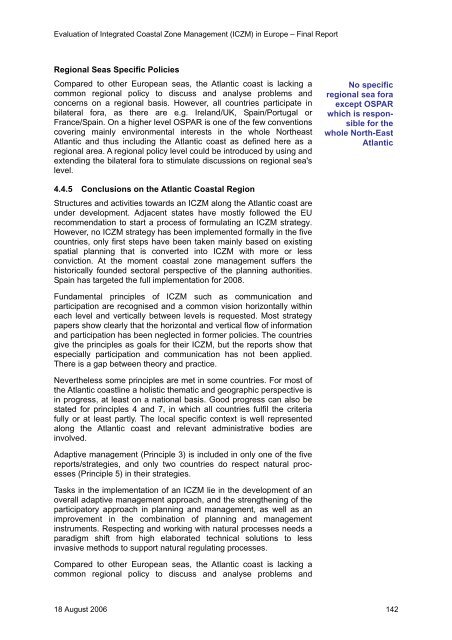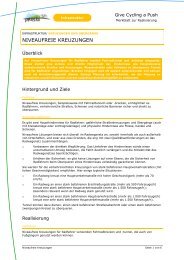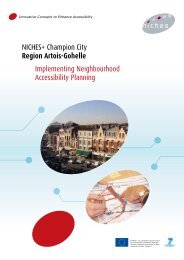Evaluation of Integrated Coastal Zone Management (ICZM) in ...
Evaluation of Integrated Coastal Zone Management (ICZM) in ...
Evaluation of Integrated Coastal Zone Management (ICZM) in ...
You also want an ePaper? Increase the reach of your titles
YUMPU automatically turns print PDFs into web optimized ePapers that Google loves.
<strong>Evaluation</strong> <strong>of</strong> <strong>Integrated</strong> <strong>Coastal</strong> <strong>Zone</strong> <strong>Management</strong> (<strong>ICZM</strong>) <strong>in</strong> Europe – F<strong>in</strong>al Report<br />
Regional Seas Specific Policies<br />
Compared to other European seas, the Atlantic coast is lack<strong>in</strong>g a<br />
common regional policy to discuss and analyse problems and<br />
concerns on a regional basis. However, all countries participate <strong>in</strong><br />
bilateral fora, as there are e.g. Ireland/UK, Spa<strong>in</strong>/Portugal or<br />
France/Spa<strong>in</strong>. On a higher level OSPAR is one <strong>of</strong> the few conventions<br />
cover<strong>in</strong>g ma<strong>in</strong>ly environmental <strong>in</strong>terests <strong>in</strong> the whole Northeast<br />
Atlantic and thus <strong>in</strong>clud<strong>in</strong>g the Atlantic coast as def<strong>in</strong>ed here as a<br />
regional area. A regional policy level could be <strong>in</strong>troduced by us<strong>in</strong>g and<br />
extend<strong>in</strong>g the bilateral fora to stimulate discussions on regional sea's<br />
level.<br />
No specific<br />
regional sea fora<br />
except OSPAR<br />
which is responsible<br />
for the<br />
whole North-East<br />
Atlantic<br />
4.4.5 Conclusions on the Atlantic <strong>Coastal</strong> Region<br />
Structures and activities towards an <strong>ICZM</strong> along the Atlantic coast are<br />
under development. Adjacent states have mostly followed the EU<br />
recommendation to start a process <strong>of</strong> formulat<strong>in</strong>g an <strong>ICZM</strong> strategy.<br />
However, no <strong>ICZM</strong> strategy has been implemented formally <strong>in</strong> the five<br />
countries, only first steps have been taken ma<strong>in</strong>ly based on exist<strong>in</strong>g<br />
spatial plann<strong>in</strong>g that is converted <strong>in</strong>to <strong>ICZM</strong> with more or less<br />
conviction. At the moment coastal zone management suffers the<br />
historically founded sectoral perspective <strong>of</strong> the plann<strong>in</strong>g authorities.<br />
Spa<strong>in</strong> has targeted the full implementation for 2008.<br />
Fundamental pr<strong>in</strong>ciples <strong>of</strong> <strong>ICZM</strong> such as communication and<br />
participation are recognised and a common vision horizontally with<strong>in</strong><br />
each level and vertically between levels is requested. Most strategy<br />
papers show clearly that the horizontal and vertical flow <strong>of</strong> <strong>in</strong>formation<br />
and participation has been neglected <strong>in</strong> former policies. The countries<br />
give the pr<strong>in</strong>ciples as goals for their <strong>ICZM</strong>, but the reports show that<br />
especially participation and communication has not been applied.<br />
There is a gap between theory and practice.<br />
Nevertheless some pr<strong>in</strong>ciples are met <strong>in</strong> some countries. For most <strong>of</strong><br />
the Atlantic coastl<strong>in</strong>e a holistic thematic and geographic perspective is<br />
<strong>in</strong> progress, at least on a national basis. Good progress can also be<br />
stated for pr<strong>in</strong>ciples 4 and 7, <strong>in</strong> which all countries fulfil the criteria<br />
fully or at least partly. The local specific context is well represented<br />
along the Atlantic coast and relevant adm<strong>in</strong>istrative bodies are<br />
<strong>in</strong>volved.<br />
Adaptive management (Pr<strong>in</strong>ciple 3) is <strong>in</strong>cluded <strong>in</strong> only one <strong>of</strong> the five<br />
reports/strategies, and only two countries do respect natural processes<br />
(Pr<strong>in</strong>ciple 5) <strong>in</strong> their strategies.<br />
Tasks <strong>in</strong> the implementation <strong>of</strong> an <strong>ICZM</strong> lie <strong>in</strong> the development <strong>of</strong> an<br />
overall adaptive management approach, and the strengthen<strong>in</strong>g <strong>of</strong> the<br />
participatory approach <strong>in</strong> plann<strong>in</strong>g and management, as well as an<br />
improvement <strong>in</strong> the comb<strong>in</strong>ation <strong>of</strong> plann<strong>in</strong>g and management<br />
<strong>in</strong>struments. Respect<strong>in</strong>g and work<strong>in</strong>g with natural processes needs a<br />
paradigm shift from high elaborated technical solutions to less<br />
<strong>in</strong>vasive methods to support natural regulat<strong>in</strong>g processes.<br />
Compared to other European seas, the Atlantic coast is lack<strong>in</strong>g a<br />
common regional policy to discuss and analyse problems and<br />
18 August 2006 142
















